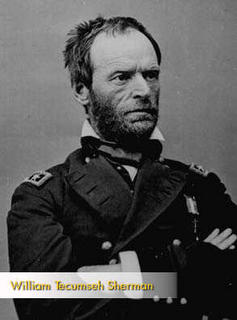Sherman & Maurya.

This is coolbert:
Interesting interview on National Public Radio yesterday with E.L. Doctorow. One of America's most esteemed living author [the most esteemed living author [??]].
Doctorow is the author of a number of novels and screenplays. His latest is called the "The March". A historical novel set primarily in the Georgia of 1864, during the time of Sherman's march from Atlanta to Savannah-by-the-Sea.
The march of Sherman's army is of course one of the most famous [infamous [??]] episodes of American history.
The original march through Georgia being followed by marches through South and North Carolina, culminating in the surrender of the southern troops under the command of the Confederate General Joe Johnston. This surrender, coming after the surrender of Lee's army to Grant, for all purposes was the end of the American Civil War. A war within which William T. Sherman and his troops played a decisive and controversial role.
[Johnston held Sherman in such high esteem after the war that even decades later Johnston attended the funeral of Sherman, caught a cold, and died two weeks subsequently himself!!]
To this day, Sherman and his men are considered by southerners to be the epitome of cruel, barbaric, even sadistic behavior. Sherman is a man who in some quarters is seen as a man suffering from mental derangement.
However, Doctorow does feel that Sherman MUST have had pangs of regret in the aftermath of the war.
There are some historical observations that seem to bear this out.
Sherman DID give very generous surrender terms to the army of Johnston. Surpassingly more generous than the terms offered to Lee by Grant. Even Lee himself commented that Grant had given very generous terms of surrender. And Sherman offered even MORE to Johnston!!??
Sherman did NOT accompany his army as it went north to participate in the victory march of the Federal forces through the streets of Washington D.C. Rather, Sherman hastened south to the areas his army had devastated, hoping to speed reconstruction and aid those that needed help!!
So much so was Sherman's behavior felt to be too generous that Grant was sent south to reign in Sherman, who was acting in a manner NOT in touch with the general mood [less forgiving] of the authorities in Washington.
Sherman in his memoirs did express in an oblique manner what can only be considered to be regret for much of what occurred during the war.
[Doctorow DOES consider Sherman and Grant both to be an excellent writers].
Sherman DID seem to be a man that can only be described as "penitent". Again, obliquely so and not direct. But penitent nonetheless. His attitude can best probably be summed up by the realization that Sherman knew the war was necessary, but also that he regretted that it was so. DID not glorify his role or that of his army.
Sherman is reputed to have remarked in the early stages of the conflict:
"The south has chosen war as the remedy for the situation, let us therefore give them a good dose of it [war]!!"
Having given the south a good dose of war, Sherman later MUST have analyzed his decisions with hindsight.
In the sense that Sherman DID apparently have regrets for any excesses that may have occurred as part of his actions or the actions of his army, he was preceded in this regard by another man of war.
A man of war that live 2300 years before Sherman.
Ashoka Maurya.

A GREAT king [ruled 268 B.C. - - B.C.] of India. A king who embarked on a SERIES of conquests and wars that united much of the Indian sub-continent under his rule.
Ashoka was also a Buddhist, although in the early stages of his life he does NOT seem to be either devout or living up to Buddhist teachings regarding violence!!
[probably like a modern American President. Professing Christianity but still secular outlook toward matters of state.]
Ashoka also DID have regrets in the aftermath of his conquests. He surveyed his dominion and realized that what he possessed was gained through much suffering and sorrow. Suffering and sorrow that were a direct result of his actions and the actions of his army.
Ashoka DID also become a penitent. Attempted to ameliorate the suffering he had caused. DID works of good. Erected religious sites all throughout his realm. Sent Buddhist missionaries to all parts of the world, literally, some even having been known to have preached in the city of Alexandria, in what is now Egypt [at the time under the Ptolemaic dynasty].
According to Joseph Campbell:
"When he beheld, however, the havoc of sorrow, misery, and death that his victory had caused, he was filled [like the young prince Gautama] with a deep sorrow, and repenting of the nature of the world, joined the Buddhist Order as a lay disciple and the first Buddhist king. He is supposed to have supported 64,000 monks and to have built not only countless monasteries . . . . It was under the patronage of Ashoka that the Buddhist world mission was initiated."
Ashoka Maurya and William Tecumseh Sherman. Two men of war who were obviously thoughtful men of conscience, regardless of what the history books say!!
coolbert.

0 Comments:
Post a Comment
Subscribe to Post Comments [Atom]
<< Home